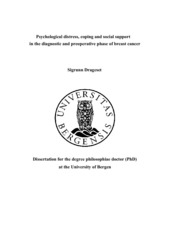| dc.description.abstract | Aims: The main aim of this thesis was to describe the psychological distress, coping and social support among women in the diagnostic and preoperative phase of breast cancer using quantitative and qualitative approaches in sequence. This included descriptions of relationships between demographic variables, social support, anxiety, coping and defence strategies among women with suspected breast cancer, as well as in-depth descriptions of the women’s experiences after having received a breast cancer diagnosis, including their coping strategies and experiences of social support while awaiting primary surgery. The theoretical frameworks were theories about coping (Ursin 1988, Lazarus 1999), social support (Weiss 1974) and nursing (Adaptation Model, Roy 2009, and Uncertainty in illness, Mishel 1988). Material and methods: In the quantitative study data were collected by self-administrated questionnaires from 117 women who had undergone a breast biopsy. The questionnaires concerned: the Social Provisions Scale, the State-Trait Anxiety Inventory, the Utrecht Coping List and the Defense Mechanisms Inventory. In addition, data regarding age, level of education, employment, marital status and household status were collected. Data were collected in the qualitative study through individual semi-structured interviews with 21 women with newly diagnosed breast cancer the day before surgery. The interviews were analysed according to Kvale’s qualitative meaning condensation method. Findings: The results in Paper I showed that patients reported elevated levels of anxiety and high levels of social support. The anxiety was most strongly and negatively related to “instrumental-oriented coping”, followed by “cognitive defence” and unrelated to “defensive hostility”. Contrary to expectations, anxiety was unrelated to “emotion-focused coping” and social provisions. Social provisions were somewhat related to “instrumental-oriented coping”, but sparsely related to “emotion-focused coping”, unrelated to “cognitive defence” and partly negatively related to “defensive hostility”. In Paper II the results showed that social support was positively related to “instrumental-oriented coping”, and “emotion-focused coping” and unrelated to “cognitive defence” and “defensive hostility”. Higher education levels were related to a greater use of “instrumental-oriented coping”, while lower education levels, being unemployed and being single/divorced/widowed were related to a greater use of “cognitive defence”. Educational level was the most important contributor to social support. “Attachment” and education were the most important contributors to “instrumental-oriented coping”, with education being the strongest predictor. A qualitative study was performed in order to gain in-depth understanding on how anxiety was experienced, on how social support was experienced and used, and on the coping strategies that were used to deal with the situation. In the qualitative interview study, Paper III, the themes identified were feeling healthy but having to adapt to disease, waiting, uncertainty, having to inform others and existential awareness. Having to wait was experienced as frightening, painful, long and difficult but also necessary. Some expressed apprehension because they could not do anything about their situation. Others emphasised that it was good to have some time between diagnosis and surgery to become personally prepared and spend time with loved ones. Informing others of the diagnosis was a great burden for most of the women. Social networks could both give and need support. In Paper IV the prominent themes within coping were revealed as step-by-step, pushing away, business as usual, enjoying life, dealing with emotions, preparing for the worst and positive focus. The women were very aware of the threat of death, but at the same time were hopeful and optimistic. In general, they wanted to be treated as usual. Pity and compassion could increase their feelings of fear and vulnerability. Emotions were dealt with either by openness or by holding back. In Paper V themes revealed in connection with social support were available support, information and advice, care, having confidants, and balancing distance and closeness. Knowing that both family and healthcare professionals were available and caring gave a sense of security. Professional information and a professional contact with whom they could talk personally were essential. Social support gave strength, but too much could be experienced as difficult and frightening. The women needed a balance between distance from and closeness to their social network. Conclusions: While awaiting a breast cancer diagnosis, “instrumental-oriented coping” and “cognitive defence” were connected to low anxiety. Social support and “emotion-focused coping” did not in themselves help to reduce anxiety. Patients who coped best had a reasonably good education and received social support from relationships characterised by “attachment”. Women who used a defensive hostile coping style tended to receive poor social support. While awaiting breast cancer surgery, the women used most energy handling their uncertainty about the future and the severity of their cancer. Having to inform others was experienced as a lonely burden of being obliged to both inform and offer consolation. Avoiding being overwhelmed by emotional reactions was a major goal in the women’s coping strategies. Keeping the diagnosis at some distance helped. The women’s coping strategies displayed similar patterns but diverged on some points. Social support was an important resource for women with breast cancer but could be a double-edged sword as the networks’ offered support could sometimes be a burden. Healthcare professionals were considered to be an important source of social support. By being aware of women’s individual needs and different coping strategies, nurses and other healthcare professionals can improve their support to help women cope in this vulnerable situation. | en_US |

